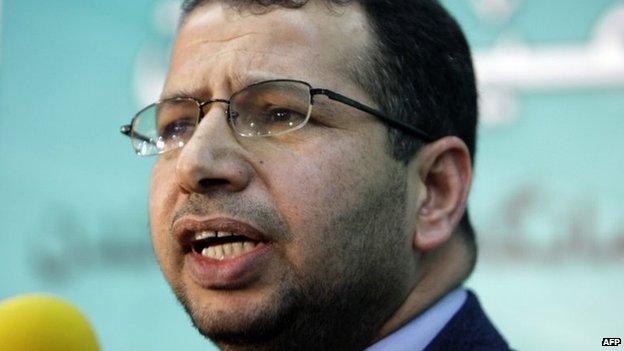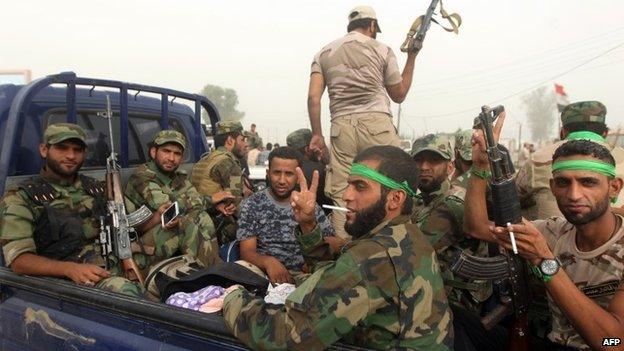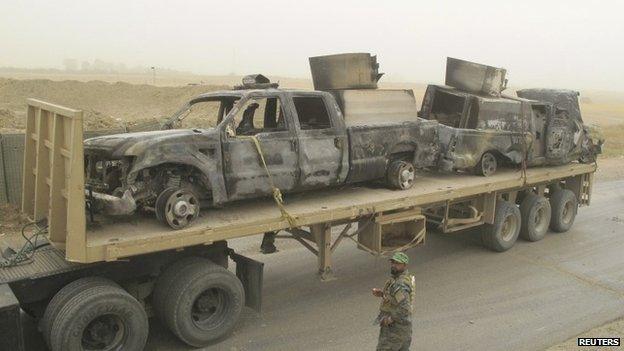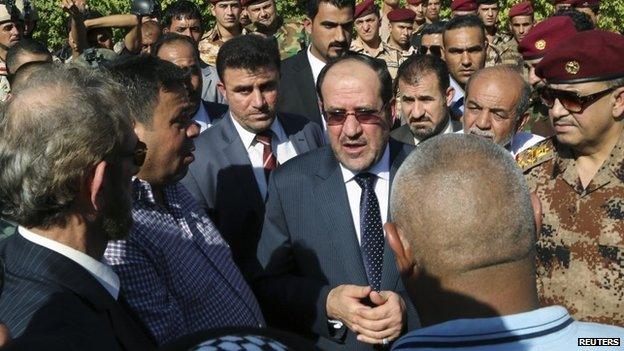Iraq's parliament breaks deadlock to elect new speaker
- Published

Salim al-Jabouri received almost 60% of the votes in the 328-seat parliament
Iraq's parliament has elected Salim al-Jabouri as speaker, breaking weeks of political deadlock amid a jihadist-led Sunni rebellion in the north and west.
The main Sunni Arab bloc in the Council of Representatives had nominated the moderate Islamist for the position.
Despite the progress, it is not clear that politicians will be able to move speedily to the next steps of selecting a president and a prime minister.
Earlier, government forces launched an offensive to retake the city of Tikrit.
The defence ministry said troops had begun their assault at dawn against militants led by the Islamic State in Iraq and the Levant (Isis).
The initial fighting focused around the southern Shishin district of Saddam Hussein's home city, officers told the Reuters news agency.

Shia militiamen and volunteers have joined the fight against the jihadist-led rebels

Fierce fighting between the rebels and government forces have left hundreds dead since early June

Troops were also heading towards Tikrit's hospital, which is on a strategic area of high ground, and the former presidential palaces, where Isis had been holding captives and running Islamic courts, they added.
Tikrit was captured on 11 June as part of a lightening offensive led by Isis that has seen the government lose control of large swathes of territory.
'Failed state'
Iraq's politicians have been urged by leading clerics and foreign powers to unite in the face of the rebellion.
However, the previous two sessions of parliament since the results of April's elections were ratified ended without a speaker being chosen - the first step in the process of forming a government.

Iraq's constitutional timetable
According to Iraq's constitution, the Council of Representatives was required to elect a new speaker during its opening session
It must choose a president within 30 days of electing a speaker
Within 15 days of the president's election, the largest bloc must nominate a new prime minister
Under a de facto power sharing agreement, the speaker is a Sunni Arab, the prime minister a Shia Arab, and the president a Kurd
After the 2010 elections, it took nine months to form a new government

On Tuesday, Mr Jabouri won 194 of the 273 votes cast in the 328-seat chamber. A second candidate, Shorouq al-Abayachi, received 19 votes.
Allies of Prime Minister Nouri Maliki, a Shia Arab, had said the vote would only go ahead once a deal was struck between the main blocs on the nominees for the positions of Speaker, president and prime minister, which traditionally go to a Sunni Arab, a Kurd and a Shia Arab respectively.

Nouri Maliki says removing him could have an adverse effect on the already demoralised armed forces
However, there was no immediate sign that consensus had been reached.
As the leader of the bloc that won the most seats two months ago, Mr Maliki has demanded the right to attempt to form a governing coalition.
But he has faced calls from his Sunni, Kurdish and Shia opponents to step down because of his handling of the security crisis, as well as what they say are the sectarian and authoritarian policies he pursued during his previous two terms in office.
Last week, Mr Maliki angered the autonomous Kurdistan Regional Government (KRG) by accusing it of sheltering jihadists and supporters of Saddam's outlawed Baath Party.
Falah Mustafa Bakir: "Iraq is divided into three entities."
Kurdish politicians have suspended participation in the outgoing government in protest.
The prime minister has criticised the Kurds for seizing disputed areas in the north during the Isis offensive and announcing that they will hold a referendum on independence.
On Tuesday, the KRG's Foreign Minister Falah Mustafa Bakir said Iraq was a "failed state" and laid the blame on Mr Maliki.
"It is in the interest of all of the Iraqi peoples for Prime Minister Maliki to step down. The Iraqi government has failed to provide security. It has failed to provide services. It has failed to provide a good system of governance," he told the BBC.
Are you in Iraq? Have you been affected by recent events? You can email your experiences to haveyoursay@bbc.co.uk, external using the title 'Iraq conflict'.